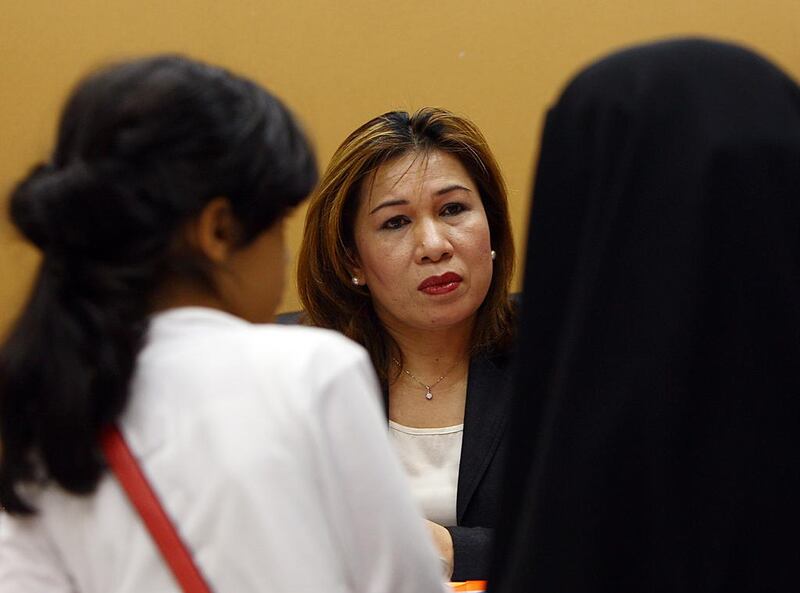ABU DHABI // UAE authorities should set up a system to reduce the number of absconding domestic workers and to track their whereabouts, participants at a Ramadan Council said.
They also proposed establishing an office under the Ministry of Interior to directly supervise and regulate the recruitment and deployment of domestic workers from overseas to protect the rights of workers and their employers.
The council, hosted by the Emirati businessman Nasser Al Yamahi in Al Shalila, Abu Dhabi, was organised by the Ministry of Interior’s Law Respect and Culture Bureau.
The participants also called for reducing fees to bring domestic workers into the country by implementing several procedures, including requiring workers to undergo medical tests in their home country.
In March the Federal National Council discussed the need to monitor the fees – between Dh8,000 and Dh12,000 – charged by agencies to bring domestic workers to the UAE.
Sultan Al Mansouri, head of the Higher Committee for Consumer Protection, told the FNC that he was aware recruitment costs had risen in the past few years.
Mr Al Mansouri, also the Minister of Economy, said several agencies were working to resolve the situation. One solution would be for the two ministries to introduce a standard contract for domestic workers. A new standard contract, produced by the Ministry of Interior, took effect on June 1.
Juliet Lasalita, manager at an Al Ain-based recruitment agency, welcomed proposals to set up an office under the Interior Ministry to regulate relations between employers and agencies, and to reduce fees.
“My agency charges Dh7,500 to Dh8,000 in recruitment fees and costs while many agencies are exploiting residents by charging up to Dh13,000,” she said.
“These unscrupulous agencies not only charge exorbitant rates but bring in workers who are not qualified for the job.”
Recruitment agencies in Indonesia charge a $2,800 (Dh10,284) commission for every domestic worker they send to the UAE.
“This encourages agencies to charge their clients ridiculously high fees,” Ms Lasalita said.
The Ramadan Council also suggested using mass and social media to raise awareness and educate family members on how to treat domestic workers. The rights and obligations of both parties would be explained, to help ensure a healthy relationship.
Domestic workers have become a part of almost every Emirati household, Mr Al Yamahi said.
“However, it is also a risky matter if the relationship between domestic workers and their employers is not properly managed and based on Sharia rules and laws,” he said.
Yusuf Al Mutlaai, who attended the council meeting, warned against imposing long working hours on domestic workers or forcing them to carry out strenuous tasks.
“We are bound by our genuine Emirati traditions to treat domestic workers fairly, regardless of our race or religion, as stipulated by the applicable laws that guarantee rights of all individuals, without exception.”
Another participant, Hassan Al Shujaai, described domestic workers as a “time bomb”, particularly when tense relationships prompted them to flee their employer’s homes.
“Absconding domestic workers may have security and social implications for the employer’s family and the entire society because nobody knows where the maid may go or what she would do to stay out of sight,” he said.
Housemaids tend to flee their employer's homes after complaining of being mistreated, overworked and unpaid.
The workers’ probationary period should be increased to not less than six months to allow employers to get to know their hired help better, check their character and behaviour, and their ability to carry out tasks, Mr Al Shujaai said.
“At the moment, the probationary period is four months and we don’t mind if it is increased to six months,” said Ms Lasalita, who has lived and worked in the UAE for 24 years.
“The sponsor returns the maid to the agency [if they do not get on] and gets his money back.
“The agency then looks for a new sponsor for the maid.”
rruiz@thenational.ae






